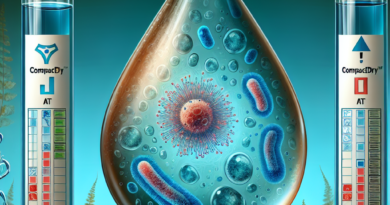Accuracy of the Colilert-18 System for Detecting E. coli in Subtropical Marine Waters
Understanding Colilert-18 and Its Significance in Water Quality Testing
Ensuring the safety of our water sources is a critical aspect of public health. One of the primary methods of assessing water quality involves testing for the presence of coliform bacteria, particularly Escherichia coli (E. coli), which serve as indicators of fecal contamination. The Colilert-18 system, developed by Idexx Laboratories, Inc., is a widely accepted technology that offers a rapid and standardized approach for detecting total coliforms and E. coli in water samples. Approved by the U.S. Environmental Protection Agency for drinking water analysis, Colilert-18 has become a staple in water quality monitoring across various environments, including both fresh and saline waters.
Colilert-18’s defined-substrate technology uses specific indicators—ortho-nitrophenyl-β-d-galactopyranoside (ONPG) and 4-methylumbelliferyl-β-d-glucuronide (MUG)—to detect coliforms and differentiate E. coli from other bacteria. The presence of β-d-galactosidase enzyme, common to all coliforms, hydrolyzes ONPG, resulting in a yellow product. Meanwhile, β-d-glucuronidase, found primarily in E. coli, hydrolyzes MUG, producing a fluorescent product visible under UV light. These reactions allow for a most probable number (MPN) estimate of the bacteria present in the water sample.
However, despite its widespread use and approval, the Colilert-18 system is not without its limitations. Discrepancies have been noted in previous studies, with false positives and negatives potentially arising from various factors, including the presence of non-coliform bacteria that exhibit similar enzymatic activity. This is particularly problematic in marine environments where the diversity of bacterial species can lead to inaccurate E. coli counts. The study we are examining today delves into this issue, exploring the accuracy of Colilert-18 in subtropical marine waters.
Specific Results from the Study on Colilert-18 Accuracy
Discrepancies in Marine Water Samples
The study conducted in Pinellas County, Florida, found significant overestimations of E. coli numbers when using the Colilert-18 system in marine waters. For instance, E. coli counts frequently exceeded fecal coliform counts by 1 to 3 orders of magnitude. In contrast, freshwater samples did not display such discrepancies. When attempting to culture fecal coliforms from E. coli-positive wells inoculated with marine samples, success was limited, with only 17.1% yielding cultures of fecal coliforms, including E. coli.
Impact of Salinity on False-Positive Results
The study also investigated the influence of salinity on the occurrence of false positives. It was found that the concentration of bacteria required to cause false positives increased with the dilution of seawater with freshwater. For example, at a 1:10 dilution, false-positive E. coli results were observed with as few as 5 CFU/ml, whereas at a 1:20 dilution, it took approximately 5,000 CFU/ml to generate the same outcome.
When comparing E. coli numbers estimated by Colilert-18 to those obtained by membrane filtration, the study reported that the Colilert-18 system greatly overestimated E. coli numbers in marine water samples at a 1:10 dilution. However, when the same samples were processed at a 1:20 dilution, the Colilert-18 results were much more consistent with the membrane filtration results, indicating that higher dilutions may reduce the incidence of false positives.
Impact and Future Prospects of the Study
The implications of this research are significant for water quality monitoring, especially in subtropical marine environments. The findings suggest that the current recommended dilution for Colilert-18 may not be suitable for marine water samples due to the high likelihood of false positives. This has direct consequences for public health and economic activities, such as beach closures and water treatment processes.
Adjusting the dilution ratio to 1:20, as suggested by the study, could potentially enhance the accuracy of E. coli estimates in marine waters. However, the study also emphasizes the need for further research to confirm these findings across different marine environments and with various bacterial species that could affect the Colilert-18 system’s accuracy.
For future water quality testing, especially in marine and estuarine waters, it is recommended to confirm positive E. coli results using additional methods, such as EC-MUG incubation at 44.5°C. This would help prevent false positives caused by marine bacteria and ensure more reliable monitoring of water quality.
As we continue to strive for accurate and reliable water quality testing, this study serves as a reminder of the complexities involved in environmental monitoring. It is not a revolutionary overhaul of current practices, but rather an important step towards refining and improving the methods we rely on to protect public health and the environment.
Reference
Pisciotta, J. M., Rath, D. F., Stanek, P. A., Flanery, D. M., & Harwood, V. J. (2002). Marine Bacteria Cause False-Positive Results in the Colilert-18 Rapid Identification Test for Escherichia coli in Florida Waters. Applied and Environmental Microbiology, 68(2), 539–544. http://dx.doi.org/10.1128/AEM.68.2.539-544.2002




